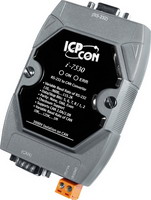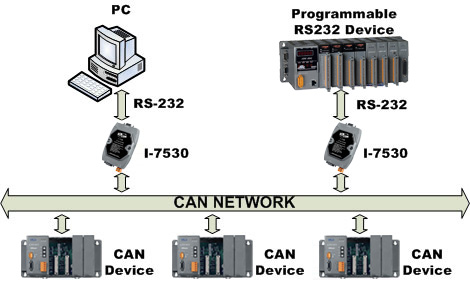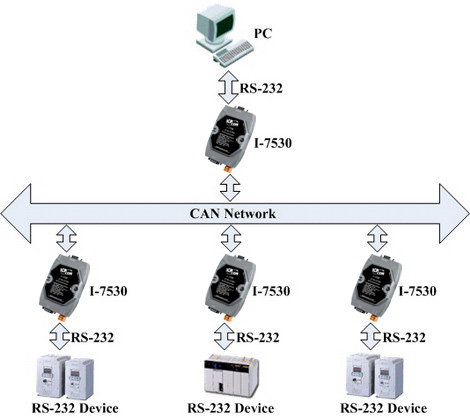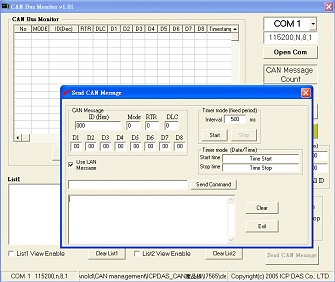|
|
 |
|
| |
|
|
|
|
| |

|
I-7530 
RS-232 to CAN Converter |
|
|
|
|
|
|
|
| |
|
|
| |
CAN (Controller Area Network) is a serial bus system especially suited to structure intelligent
industry devices networks and build smart automatic control
systems. The following figure shows the application architecture
for I-7530 modules. The PC can be the CAN host, monitor or HMI
to access/control the CAN device through the CAN network by
the I-7530 Converter. The programmable RS-232 device (For example:
I-8411/I-8431/I-8811/I-8831/W-8031/W-8331/W-8731 embedded controller)
can use the serial port to connect to the CAN network via the
I-7530 module. In order to use the CAN network with traditional
RS-232 devices, we provide a way to achieve this purpose. The
I-7530 is designed to unleash the power of CAN bus via RS-232
communication method. It accurately converts messages between
CAN and RS-232 networks. This module let you to communicate
with CAN devices easily from any PC or devices with RS-232 interface.

Moreover, we expand the functionalities of I-7530 for some special application. In pair connection mode, I-7530 can be used to connect PC with other RS-232 devices at the same time. The application architecture may be as follows.

3000V isolation
on CAN side
The CAN port of I-7530 is an isolated with 3000V isolation.
This isolation can protect the local RS-232 devices from the
damage signal coming from CAN network.
Watchdog inside
The I-7530 Watchdog is a hardware reset circuit to monitor the
I-7530’s operation status. When working in harsh or noisy environment,
the I-7530 may be down by the external signal. The circuit may
let the I-7530 to work continuously and never halt.
Power and Error
indicator display
There are two indicators on the I-7530.The power indicator can
help user to check whether the I-7530 is standby or transmitting/receiving
messages. The Error indicator will be turned on when some errors
occur on the I-7530.
|
|
| |
|
|
| |
|
|
| |
|
|
| |
• Control System•
Building Automation• Factory Automation• Distributed
data acquisition
 |
|
| |
|
|
| |
|
|
| |
|
|
| |
|
|
| |
-
Microprocessor inside with 20MHz
-
CAN interface connector: D-Sub 9-pin
-
82C250 CAN transceiver
-
Built-in CAN/RS-232 Converter firmware
-
Max transmission speed up to 1M bps for CAN
and 115.2K bps for RS-232
-
Software configurable CAN and RS-232 communication
parameters
-
Max transmission distance over 1000m (follow
CAN specification)
-
Support both CAN 2.0A and CAN 2.0B
-
Built-in jumper to select 120 ohm terminal resister
-
Mount easily on DIN-rail
-
Power, data flow and error indicator for CAN
and RS-232
-
Watchdog inside
-
Support transparent communication mode
-
Provide the transparent communication between the RS-232 devices via CAN bus.
-
Enable different RS-232 devices into an individual group in CAN bus network.
(Full-duplex communication mode of RS-232 devices is not supported)
|
|
| |
|
|
| |
|
|
| |
|
I-7530 Software Utility Features |
|
|
|
| |
|
|
| |
-
CAN bus Baud rate configuration
-
CAN acceptance filter configuration
-
CAN 2.0A or 2.0B specific selection
-
RS-232 Baud rate and data bit setting
-
RS-232 responded selection
-
Easy test to transmit/receive can messages
-
Setting for I-7530 communication mode (normal mode or pair connection mode)
|
|
| |
|
|
| |
|
|
| |
|
CAN Monitor & Datalog tool |
|
|
|
| |
|
|
| |
-
It has a CAN message field which can display the receiving CAN messages in Decimal or HEX mode.
-
Can display the timestamp of each received CAN message.
-
Users can change the display mode, up-down, down-up or stop.
-
It can count the number of received CAN messages.
-
Data Log : It can save the CAN message as “ txt ” file.
-
Has CAN ID filter function.
-
Can send CAN message to CAN BUS according the defined interval time.

|
|
| |
|
|
| |
|
|
| |
|
|
| |
|
|
| |
The test is the performance which transfer 8 bytes data frame from CAN to RS232.
|
CAN setting |
Transfer frames |
Transfer time(ms) |
RS-232 setting |
Receive frames |
Receive time (ms) |
The max frames/sec |
Data<8 byes/frme |
RS232 command length |
2.0A 1Mbps |
1,000 |
200 |
115200,n,8,1 |
1,000 |
2954 |
338 |
>=338 |
22 B |
2.0A 1Mbps |
1,000 |
200 |
115200,n,7,1 |
1,000 |
2775 |
360 |
>=360 |
22 B |
2.0B 1Mbps |
1,000 |
200 |
115200,n,8,1 |
1,000 |
3580 |
279 |
>=279 |
27 B |
2.0B 1Mbps |
1,000 |
200 |
115200,n,7,1 |
1,000 |
3337 |
299 |
>=299 |
27 B |
The test is the performance which transfer 8 bytes data frame from RS232 to CAN. |
CAN setting |
Transfer frames |
Transfer time (ms) |
RS-232 setting |
Receive frames |
Receive time (ms) |
The max frames/sec |
Data<8 byes/frame |
RS232 command length |
2.0A 1Mbps |
1,000,000 |
2,612,243 |
115200,n,8,1 |
1,000,000 |
2,612,243 |
382 |
>=382 |
22 B |
2.0A 1Mbps |
1,000,000 |
2,441,130 |
115200,n,7,1 |
1,000,000 |
2,441,130 |
409 |
>=409 |
22 B |
2.0B 1Mbps |
1,000,000 |
3,142,043 |
115200,n,8,1 |
1,000,000 |
3,142,043 |
318 |
>=318 |
27 B |
2.0B 1Mbps |
1,000,000 |
3,142,043 |
115200,n,7,1 |
1,000,000 |
2,966,646 |
337 |
>=337 |
27 B |
|
|
| |
|
|
| |
|
|
| |
|
|
| |
|
|
| |
-
RS-232 interface connector: D-Sub
9-pin
-
CAN interface connector: D-Sub 9-pin
-
Isolation voltage: 3000Vrms on the CAN side
-
Repeater request: over than 1000m (suggestion)
-
Accessories: One D-Sub 9-pin cable
-
Dimensions: 118mm x 72mm x 33mm
-
Power requirement: Unregulated 10~30 Vdc with
protection from power reversals
-
Power consumption: 1W
-
Operating temperature: -25℃ to +75℃
-
Storage temperature: -40℃ to +80℃
-
Communication speed:
115.2K bps max for
RS-232
1M bps max for CAN
|
|
| |
|
|
| |
|
|
| |
|
|
| |
|
|
| |
I-7530
|
Intelligent
RS-232 to CAN converter
|
I-7530 CR
|
Intelligent RS-232 to CAN converter (RoHS)
|
|
|
| |
|
|
| |
|
|
|
|